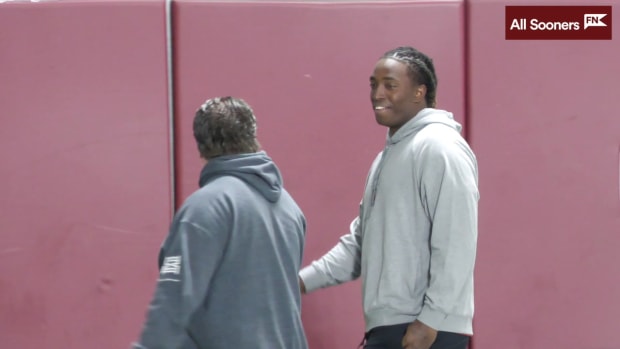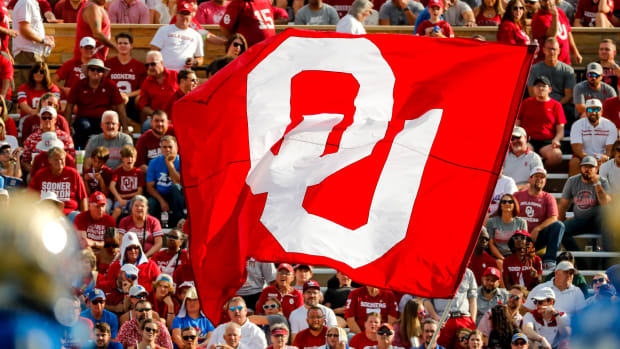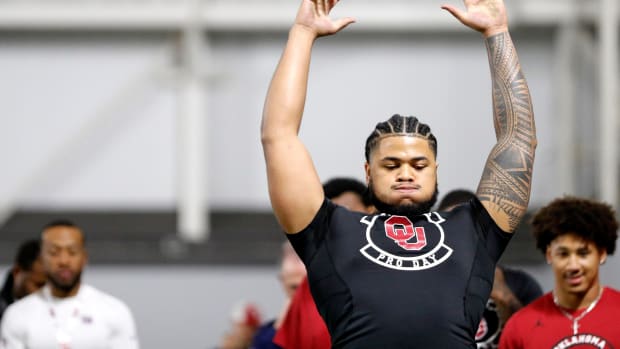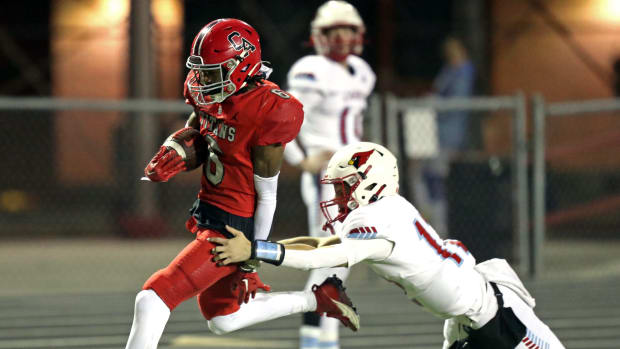Joe C. Talks OU at Army and the CFP Impact
No doubt the most pressing question among Sooner Nation this offseason isn’t about Oklahoma’s quarterback competition or the OU-Texas rivalry or whether or not the Sooners can finally win a College Football Playoff game (yet).
This offseason, OU fans want to know if they’ll be going to the Army game.
Oklahoma visits the Black Knights in West Point, NY, on Sept. 26. Michie Stadium already seats just 38,000, so there was already an insanely high demand for tickets. But with a possible — likely, even — reduction in capacity seating this fall due to the Coronavirus pandemic, fans who already bought their tickets indeed could be staying home.
The series was scheduled way back in 2009, so anticipation has been building for almost a decade. OU athletic director Joe Castiglione said in April that ticket demand was “three times” what was anticipated.
On Wednesday, Castiglione said the original plan remained in place to play the game at Army at the end of September. But Castiglione said both schools continue to assess contingencies upon contingencies.
“There really isn’t any change in the game itself, the date, the expectation,” Castiglione said during a video call with media. “Now, don’t get me wrong. We’re fully aware and mindful of anything that could change that at the moment. Whether that game happens or not, whether there’s fans allowed to be in the stands or not, you know, those are decisions that have not been made. There has not been any indication around any particular change related to that game — or any game, for that matter.
“But you all know from previous conversations that we’ve spent a great deal (of time) contingency-planning in a lot of different ways: have games, shortened seasons, games with fans, games with limited number of fans, obviously games without fans. We’re still very hopeful and optimistic that the season can get started on time, (that) we can play a 12-game schedule and accommodate as many fans as feel comfortable being there. We don’t have any more information on it at this point in time.”
Oklahoma will be aiming for its sixth consecutive Big 12 Conference championship. Doing so might open the door to another trip to the playoff — but that’s where the importance of playing the Army game comes in.
If New York isn’t safe to accommodate travelers in September, and if the U.S. Military Academy is under lockdown because the pandemic returns (or hasn’t subsided enough yet), it’s possible OU will stay at home (Castiglione has said the game would be played at a future date, rather than just canceled).
Without 12 regular-season “data points,” could OU be passed over by the committee come December? If four worthy candidates have played 12 games, and Oklahoma has played 11, would the Sooners be left out of this year’s CFP? Or would an opener against FCS Missouri State and a home game against Tennessee give the Sooners a strong enough strength-of-schedule rating?
Castiglione, who’s also a member of the College Football Playoff selection committee, said there actually is precedent for the committee to assess such a situation, although not to this possible magnitude.
“We have actually had a couple of cases to work through, seasons of certain teams that have been disrupted the past couple years,” he said. “Maybe not as much as to the level of potential we’re talking about now. I mean, there’s still a great deal of unknown.”
In both 2018 and 2019, games were canceled because of hurricanes. In 2016, LSU and Florida overcame a disagreement on a September postponement before rescheduling in November.
“On a couple of occasions, teams have lost games — in some cases, games against notable opponents on their schedule, due to weather,” Castiglione said. “You can remember back the last couple of years, teams along the Eastern Seaboard, Florida all the way through North Carolina and maybe beyond had game interruptions. In a couple of cases they were able to reschedule the games, and in several cases they were not.
“And so instead of having a 12-game schedule, they had 11-game schedules. I want to say the 2018 season was maybe more representative of schedules being affected by games not being played than any I can remember. But, I’ve only been on the committee two years. But I do remember in passing that it’s happened previously.”
One hard, immutable truth is that this could be a college football season unlike anything since World War II or even before. It’s not out of the question that some teams could face multiple cancelations. And that means a team that goes 9-0 or 10-1 with an easy schedule could lose its playoff spot to another team that goes 11-1 or 10-2 against a harder schedule.
“Losing one game is one thing. Losing multiple games may be an entirely different matter,” Castiglione said. “And we will have meetings prior to the season and determine how those factors would be considered.”
While Castiglione said such protocols are not set by the committee, he did acknowledge the role the committee would play when it does begin gathering in late fall.
“Those are matters that are also taken up by the commissioners, because they put the protocols in place, and it’s approved by the presidents,” he said. “There’s governing boards, if you will, that’s an oversight for the process itself, and the committee, you know, educates itself about the protocols.
“We talk about it all the time. In fact, we talk about them at the beginning of every meeting we have throughout the course of the selection process. And I’m sure if there are any changes or complications that they would be announced prior to the season starting.”
To get the latest OU posts as they happen, join the SI Sooners Community by clicking “Follow” at the top right corner of the page (mobile users can click the notifications bell icon), and follow SI Sooners on Twitter @All_Sooners.




